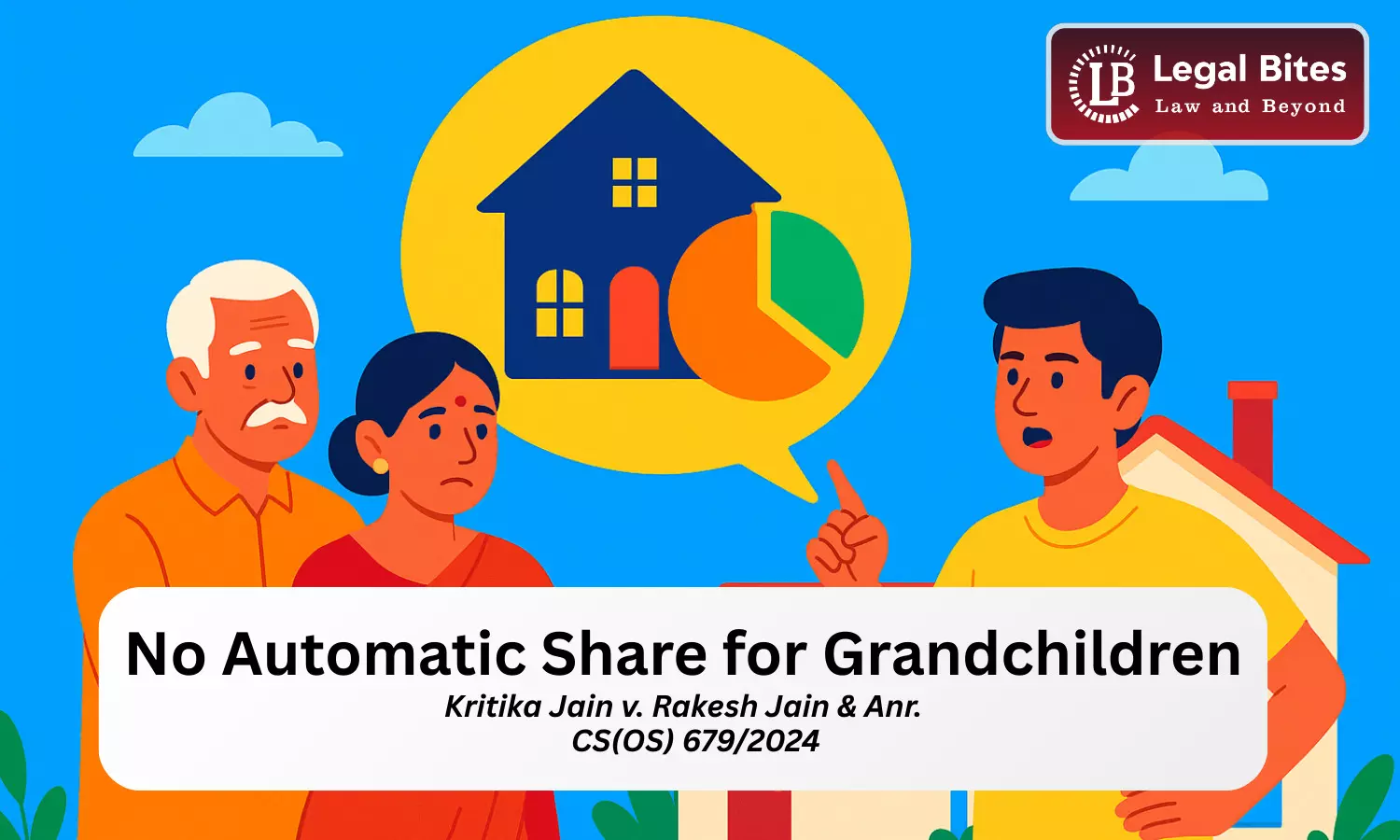
A recurring question in Hindu family law is whether grandchildren automatically acquire rights in their grandparents’ property, particularly when the parents are alive. This issue gained clarity in a recent Delhi High Court judgment in Kritika Jain v. Rakesh Jain & Anr. (2025), where the Court examined whether a granddaughter could claim a share in her grandfather’s property during her father’s lifetime.
This case serves as an important reminder of the distinction between ancestral property and self-acquired property, and how the Hindu Succession Act, 1956 (HSA) restructured the rules of inheritance.
Factual Background
- The plaintiff, Kritika Jain, filed a suit against her father (Rakesh Jain) and paternal aunt (Neena Jain), seeking partition of a residential property at Janakpuri, New Delhi.
- The property was purchased by her grandfather, late Sh. Pawan Kumar Jain, in 1972–73, who died intestate in 1994. He was survived by his widow (later deceased in 2023), son (Rakesh Jain), and daughter (Neena Jain).
- The plaintiff claimed entitlement to 1/4th share in the property, asserting it was ancestral in nature. She also sought cancellation of a relinquishment deed and an injunction against alienation of the property.
The defendants opposed the suit, filing an application under Order VII Rule 11 CPC, contending that the plaint disclosed no cause of action since grandchildren do not inherit directly when parents are alive.
Issue
- Can a grandchild claim a share in the grandparent’s property during the parent’s lifetime, particularly when the property is self-acquired and the grandparent died intestate?
Court’s Analysis
1. Pre-1956 Position under Mitakshara Law
Before the HSA, property inherited by a Hindu male from his father, grandfather, or great-grandfather was treated as ancestral property, creating automatic coparcenary rights in the next generation at birth. This meant that grandchildren could claim shares by birth.
2. Post-1956 Changes under the Hindu Succession Act
The HSA radically altered this position:
- Section 8: When a Hindu male dies intestate, his property devolves on Class I heirs (son, daughter, widow, mother, etc.).
- Section 15: Provides succession rules for intestate female Hindus.
- Section 4: Abrogates earlier Hindu law customs conflicting with the Act.
Thus, inheritance post-1956 does not automatically create coparcenary rights in grandchildren unless the parent has predeceased the grandparent.
3. Who Are Class I Heirs?
The Court emphasised that grandchildren are not Class I heirs unless their parent (child of the deceased) has already died. Therefore, when the grandfather died in 1994, his property devolved only upon his widow, son, and daughter, excluding the granddaughter.
4. Judicial Precedents Cited
- CWT v. Chander Sen (1986) and Yudhishter v. Ashok Kumar (1987): Property inherited under Section 8 is individual property, not HUF/coparcenary property.
- Trijugi Narain v. Sankoo (2019): Property devolving after 1956 via intestate succession is absolute, not ancestral.
- Surender Kumar v. Dhani Ram (2016, Delhi HC): Reiterated that only pre-1956 inherited properties or those voluntarily thrown into a hotchpotch could form HUF property.
5. Application to Present Case
- The grandfather’s property devolved on his widow, son, and daughter under Section 8 HSA.
- Upon the grandmother’s death, her share devolved under Section 15(1)(a) HSA to her children (the father and aunt of the plaintiff).
- Therefore, the father’s share became his self-acquired property, not coparcenary, and the granddaughter could not claim any birthright in it.
Key Highlights of the Decision
Justice Purushaindra Kumar Kaurav stated:
“It is pertinent to note that grandchildren, who are not children of a predeceased child, are not included in the list of Class-I heirs. Therefore, if Section 8 is correctly appreciated, the suit property cannot be deemed to have devolved on the plaintiff upon the death of her paternal grandfather, her father being alive at the time of death of the grandfather. The suit property devolved solely on the defendants and their mother. Thereafter, upon the death of the defendants’ mother, her share in the suit property devolved similarly, under Section 15 (1) (a) of the HSA, solely on the defendants.”
Key Legal Principles Established
- No Automatic Right for Grandchildren: Grandchildren cannot claim a share in grandparents’ property during the lifetime of their parent unless the parent is already deceased.
- Self-Acquired v. Ancestral Property: Property devolving under Section 8 HSA after 1956 is treated as self-acquired property of the inheriting heir.
- Coparcenary Rights Limited: Coparcenary rights exist only in ancestral property or when property is voluntarily converted into HUF property.
- Grandchildren’s Rights Conditional: Grandchildren inherit only if their parent (the direct heir) has predeceased the grandparent.
Court’s Conclusion
The Court held that:
- The plaintiff had no legal right to the property.
- Since her father was alive at the time of succession, she was excluded.
- Her claim did not disclose a valid cause of action, and the plaint was rejected under Order VII Rule 11 CPC.
Important Link
Law Library: Notes and Study Material for LLB, LLM, Judiciary, and Entrance Exams